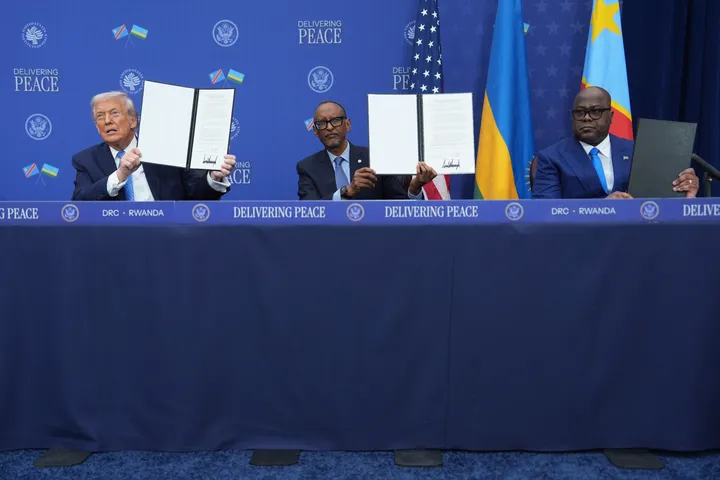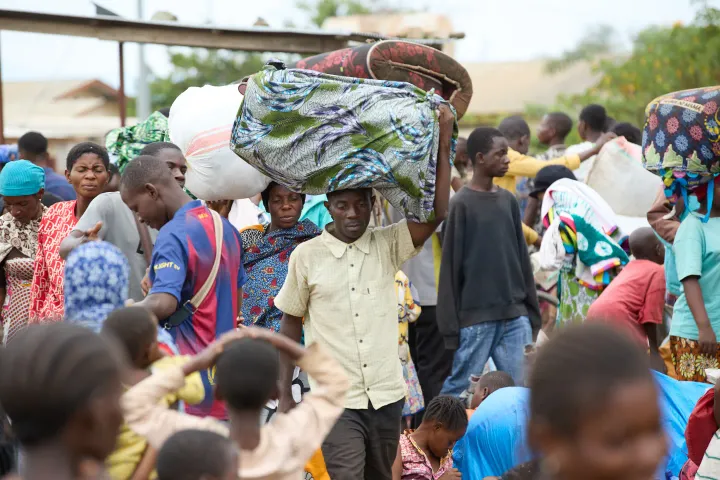By Mohamed Touzani
Moroccans will long remember the nightmare experienced that Friday evening, when the earth shook strongly in much of their country.
Thousands of them spent the night under the stars for fear of suffering the same sad fate as their compatriots in El Haouz province, located near the famous tourist city of Marrakech, the epicenter of the devastating earthquake.
The next day, fear and anguish gave way to solidarity with the people of the affected areas of the High Atlas.
"They are our compatriots. We must think of these poor people, especially children who lost a father, a mother or both at the same time in this earthquake," the head of an association tells TRT Afrika in Asni.
The man who prefers anonymity, came from Tangier leading a convoy of three vehicles loaded with aid materials for the quake victims.
Blood donations
Long queues have formed in all cities for blood donations for the injured who are currently being treated in hospitals in Marrakech and Agadir.
This immense outpouring of citizen and spontaneous solidarity has spread to all major cities, villages and towns with operations to collect food, medicine, milk, tents and clothing.
It must be said that Moroccans responded massively to the call of the heart to comfort the victims in these moments of distress and help heal their wounds.
"There was a misconception that Moroccans have lost the notions and values of solidarity and sharing. This disaster has shown that this is not the case and that Moroccans are still united in the ordeal," said Ahmed, a young trader from Casablanca, the economic capital of the kingdom.
With his three friends, he managed to gather two tonnes of milk, flour, canned goods and blankets for the rural populations of a small village of Moulay Brahim where he comes from.
Incredible solidarity
This incredible solidarity movement caused congestion on all roads leading to the High Atlas regions where agents of the Royal Moroccan Gendarmerie were deployed to coordinate operations of humanitarian convoys and ambulances that were transporting the wounded to health centers.
Nearly 3,000 people were killed in the earthquake, according to a latest assessment given by the ministry of the interior.
"Never seen before. This solidarity is heartwarming despite the enormous damage caused by the earthquake," said an Asni resident, who said he lost three members of his family in the earthquake and was waiting to see a traumatologist at the military field hospital set up by the Moroccan army.
The southern cities of Sahara are also on the frontline of the disaster with a convoy of more than 100 trucks loaded with aid heading to Marrakech.
"In moments of joy as in times of challenge, Morocco is united and in solidarity," wrote a Moroccan news website after the launch of this "gigantic" convoy.
Moroccan diaspora
The distress calls made by the victims in the early hours of the tragedy, and relayed on social networks, also found a wide echo among members of the powerful Moroccan diaspora who organized collections of medicines, equipment and tents in all host countries.
Moroccans in Spain, Belgium, Italy, the Netherlands and Germany are additionally organising to come to the rescue of their compatriots in the regions affected by this disaster that has wiped entire villages off the map.
The "Special Fund for the Management of the Effects of the Earthquake Affecting the Kingdom of Morocco", created by the Moroccan government, has begun to receive substantial contributions from private companies and public bodies.
The fund launched in the aftermath of the tragedy is meant to help the victims and undertake the reconstruction of the affected regions.
On the instructions of King Mohammed VI, who visited the wounded in Marrakech on Tuesday, Moroccan Prime Minister Aziz Akhannouch chaired a meeting devoted to the reconstruction of collapsed houses.
While Moroccan and foreign search and rescue teams are still hard at work trying to find those still buried under the rubble, the wind of generosity that blows throughout Morocco brings a glimmer of hope to the victims in moments of distress.
























